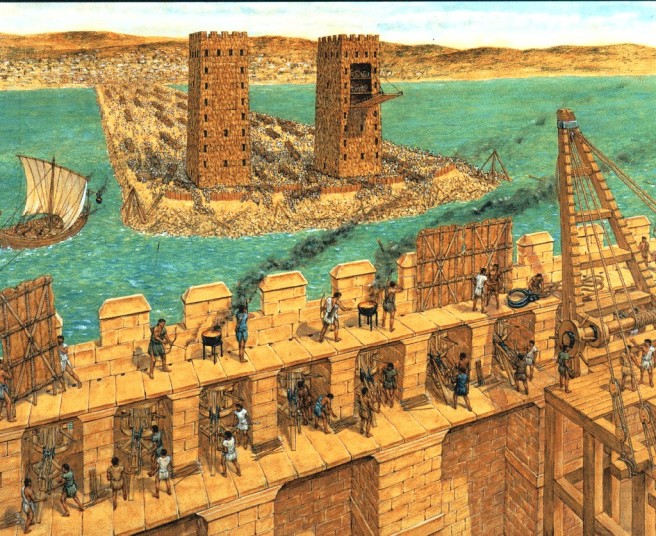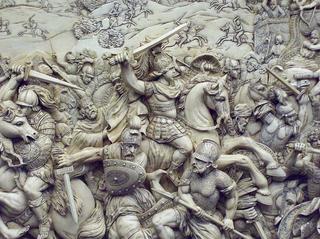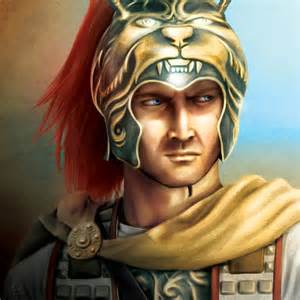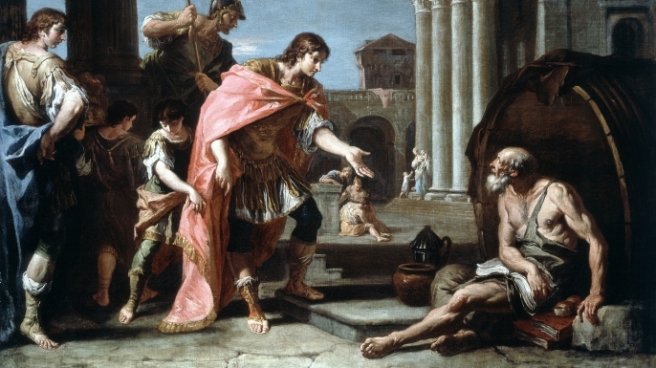By: Nicole Sweeney
How does a leader gain such titles as “the Great” or “the Terrible”? Additionally, when someone has such a title, how does a learner determine if the title was truly deserved, or if the historical perspective of the person is just clouded in deceit and lies as a means of propaganda? From my research so far, I believe that Alexander deserved and earned his title “the Great” far more than the title “the Terrible.” It is my aim to provide viable information on the life and conquest of Alexander and combine that with my personal background and intuitive feelings to clarify my opinion.
Alexander was, no doubt, a military genius. He proved his worth as a commander on several different occasions, such as his legendary siege of Tyre. The siege absorbed three months worth of time, energy, and effort for the Macedonians, and it nearly failed altogether. Because Tyre was a fortified island city, it represented a particular challenge to Alexander; a less determined leader probably would have decided to bypass it. Although his initial attempts to breach the city walls failed, the attempts alone yielded advances in catapult technology that included greater overall accuracy and increased distance capabilities. These same advances in catapult technology would prove to be indispensable to Alexander later down the road.
After months of failure, the stubborn leader decided that if he couldn’t succeed in crossing the water to reach Tyre, that he would simply create an earthen path leading right to its front gates. Alexander ordered that a causeway be built, and then he used siege towers to climb up and over the city’s defenses. (Wood, 68) At the end of the three long months, Tyre could no longer keep Alexander at bay, and he sacked the city. The fall of Tyre meant that there was no city or region that could stop, or even resist Alexander on his march to Egypt.

Above: An artistic representation of the siege of Tyre.
I believe that Alexander’s military tactics helped to earn him the title “the Great.” As previously mentioned, he used tact, the ability to create new technologies, and a headstrong attitude to tackle any obstacles on his path. These traits have value to me because my previous experience with martial arts taught me that quick, decisive action can mean the difference between life and death. However, I also realize that Alexander did not always keep the main disciplines of martial arts at the forefront of his mind, and he committed acts of terrible brutality and cruelty during his conquest, such as the merciless slaughter of the Theban population.
When Alexander attacked Thebes, he killed all in his path, sparing only the the descendants of the famous poet, Pindar. (Wood, 32). It seems necessary to point out that, although this act sound atrocious to modern ears, this type of behavior is likely a product of the time in which he lived. In a time where one could face the penalty of death as the result of a minor infraction or simply speaking out of turn, the slaughter of conquest and war may not seem so barbaric. It is also imperative to note that this military action at Thebes was one of the first things that Alexander did when he rose to power after the death of his father, Phillip II. The city was in revolt, thus the reason for his visit, and that apparently displeased Alexander greatly.
Alexander’s prowess as a warrior and his unifying presence as a leader were on full display as he rallied against the Persian Empire’s military forces at the battle of Gaugamela. At Gaugamela, Alexander and his men stood severely outnumbered by the Persians. However, he and his men came prepared with mounted elephants, scythed chariots, and cavalry members equipped with chain mail. (Covington, 73) Even more important than these advantages, Alexander understood how to use them effectively to ensure victory. Known for his aggressive tactics, he ultimately decided to carve a path straight through the Persian infantry with the scythed chariots and used his heavy cavalry to flank the Persian forces on both sides. (Porter) Before long, the Persian King, Darius III, retreated from the battle on horseback, hoping to avoid facing Alexander personally. Without a commanding leader, the Persian forces submitted to Alexander and his victory at Gaugamela was complete. (Covington, 81)
Surely, Alexander’s military genius contributed to my perception of his greatness. I find his ability to overcome the Persians at Gaugamela nothing short of miraculous because of the vast difference in numbers of men used by both sides. Although many of my sources on this topic disagree about the actual number of men used by the Greeks and the Persians, all of the sources agree about one thing: there was an extreme difference in the size of their forces, and the Greeks were, indeed, heavily outnumbered.
I can only imagine how the Greeks must have felt looking out at thousands upon thousands of Persians whose single priority was to stop their advancement dead in its tracks. As I learned in my martial arts training, the morale of the forces involved plays a role in the effectiveness of an offensive attack. Therefore, I believe Alexander must have given some kind of speech or just simply said something inspiring to his men to keep their morale high, despite the seemingly impending doom. I feel that Alexander’s military tactics and his ability to inspire confidence in his men are what truly won him the battle of Gaugamela. Without confidence, I do not believe that the Greeks could have outmatched the massive Persian military.

Above: Alexander the Great at the Battle of Gaugamela.
Outside of military aspects, Alexander’s politics also helped to convince me of his greatness. Although he is most known for his military tactics and warrior’s spirit, he was far more than a mere brute. He was also a strong-minded politician. As king, Alexander inherited not just his father’s experienced and battle-tested military forces, but he also inherited his efficient court systems. (Weber, 86) The courts of Alexander served him well by providing him with an open-line of communication with his companions and followers. In his section of an anthology of the life Alexander, Gregor Weber agrees with me about the significance of the courts by saying that, “this (the courts) was an effective means of extracting obligations from his followers and of interacting with them as equals.” (Weber, 89)
These courts followed Alexander wherever he went, and usually existed in large, covered spaces, such as the palaces of conquered people. The courts were filled with his followers, servants, warriors, historians, scribes, and all kinds of people with various responsibilities for the war effort. Here, many political decisions were made after Alexander heard input from his followers and deliberated on the topic at hand personally. It also served as a way to ease the stress of war by occasionally including entertainment such as live music, dancing, or dramatic plays, accompanied by food and beverage. (Weber, 83)
I believe this cooperation and understanding between Alexander and his followers also contributed to his greatness by providing him with deep loyalty from his people, especially those labeled as his companions. I think that Alexander valued the thoughts of his comrades because he may have understood that if people can set their petty differences aside, they can combine their diverse, individual strengths to become a truly unstoppable force. In my experience with the recent presidential election, I observed that most people look for the candidate who they believe will represent their best interest to give their trust and loyalty. Comparably, I find it believable that Alexander gained such a loyal following because he allowed the voices of others to be heard while making political decisions in his courts. His followers must have felt secure knowing that their leader had the capability to think beyond just his own personal gain, as countless leaders before and since Alexander have failed to understand.
Alexander also understood the importance of a diverse, strong people. He displayed an understanding of this knowledge by taking part in various cultural and religious traditions of non-Greeks that he came across in his travels. For example, Alexander was once the pharaoh of Egypt, even as a non-Egyptian, which is rare and untraditional. (Wood, 76) He was also known to wear exotic clothing, and abandoned traditional Greek garb. Alexander even attempted to mix people under his rule of different ethnic backgrounds, at one point even going as far as to mandate marriages between his men and the women of the conquered people, claiming to unite the Greeks and Persians. (Wood, 218)

Above: A recreation of the likeness of Alexander the Great.
Since the Greeks and Persians had such a long-standing history of conflict, even in Alexander’s time, the two cultures clashed on nearly every level despite the developing world around them. The most famous example of this clash is the classic story of the the 300 elite Spartan warriors fighting to the last man against a massive Persian force at the Pass of Thermopylae, with the intent to stall their advancement so that other Greeks would have more time to flee to safety. Even though this event was long before Alexander’s time, he was able to identify that the ongoing conflict would not cease without action. Therefore, his attempts to blend the cultures of Greeks and Persians may have been a plan to eliminate the conflict and combine the strengths of both people to become one efficient, gigantic force.
The Greeks have gone down in history as a strong, motivated people, such as the 300 Spartans and their iron will and determination, not to mention their intense warrior training and dedication to focused team efforts. (Fox, 66) On the other hand, the Persians also had many strengths within their empire. Their military forces came equipped with versatile horse-archers and elite soldiers, like the notorious core troops: the Ten-Thousand Immortals. The sheer numbers of their forces were known to overwhelm most other civilizations in the world at that time. After all, Persia was a well-developed empire!
One of the things that really spurred the development of the Persian empire was its physical location, residing in between Europe and Asia with relatively easy access to Africa. It is reasonable to state that Persians would likely have had regular contact with Africans, Europeans, and Asians, especially from developed trade-operations like the Silk Road. Because of this, Persia had long been considered a major world trade route. (Frye, 39) Prosperity and Persia go hand-in-hand. Overall, each culture had definite strengths, but neither culture had all of the above advantages. Through cultural and ethnic blending, I believe Alexander sought to make a greater society to unify the two independently strong civilizations.
I think that Alexander’s attempted unification of the Greeks and Persians showed wisdom beyond his time. It seems amazing that an ancient warrior, despite his flaws, megalomania, and propensity for violence, seemed to understand that human oneness is the greatest strength of all. Not just in the direct way that their physical strengths can be combined, but in an implied sense that the hatred and conflict between the two civilizations could eventually ease. I think that Alexander truly believed that his work would result in a strong, intellectual, and peaceful new civilization. And, in a way, he succeeded. by the end of his life, Alexander had conquered so many people and covered so many territories that he essentially created the first ever combined east-west superpower, which led to the exchange of ideas, skills, technological advances, and a new generation of children who represented both cultures equally.

Above: Alexander introduces himself to Diogenes, a famous philosopher who responded with, “Stand aside. You’re blocking my sun.” Alexander was reportedly amused by the man’s lack of enthusiastic response while meeting a king and he stated, “If I were not Alexander, I would be Diogenes.” (Barksdale) In fact, Alexander was known for spending time conversing with philosophers and gurus he met during his lifetime. This was likely out of respect and admiration for Alexander’s own teacher and mentor, Aristotle.
Even though Alexander conquered much of the known world in his time, he did not receive the fairy-tale ending he so sought after. At nearly 33 years of age, Alexander fell ill and died. Unfortunately, Alexander’s untimely and suspicious death prevented the Macedonian Empire from carrying on. I believe that the fall of the empire may have been avoided if Alexander had only selected a successor. In addition to this, his closest companion, Hephaestion, died in a similar manner not long before Alexander’s own illness started. It is possible, but not provable, that Alexander’s own men had betrayed and poisoned him, and that is the reason that he did not appoint a successor in the days leading up to his death, even though he was still offering military advice to his closest companions after his fatal fever had set in. (Wood, 226) He may have known that refusing to appoint a successor would create in-fighting and prevent anyone from taking his place. Yes, Alexander was tactical and stubborn until the very end.
To me, Alexander’s superior leadership abilities are quite apparent. From his efficient court systems, to his bold military strategy, to his natural charisma and talent with a sword, Alexander proved his ability to lead others effectively, and he and his men stood largely unchallenged in the ancient world. Even with as far as he traveled and as much as he fought, he had never lost a battle. Because of the destructive nature of war and the time period he existed in, I can understand why some people still view Alexander as nothing but an evil tyrant. However, his actions and decisions throughout his life that suggest to me a greatness that transcends personal gain through conquest.
“There is nothing impossible to him who will try.”
-Alexander the Great
Works Cited
Barksdale, Nate. “8 Surprising Facts About Alexander the Great.” May 13, 2014. http://www.history.com/news/history-lists/eight-surprising-facts-about-alexander-the-great. Web.
Covington, Richard. “The Mighty Macedonian: Alexander the Great.” Smithsonian. November 1, 2004: 72-82. eLibrary. Web.
Fox, Robin Lane. “Sparta.” The Classical World: An Epic History from Homer to Hardrian. New York: Basic Books, 2006. 62-81. Print.
Frye, David. “Spartan Stand at Thermopylae.” Military History. January 1, 2006: 38-42. eLibrary. Web.
Porter, Barry. “Battle of Gaugamela: Alexander vs. Darius.” Military History. September 17, 2007. eLibrary. Web.
Weber, Gregor. “The Courts of Alexander the Great as a Social System.”Alexander the Great: A New History. Eds. Waldemar Heckel and Lawrence A. Tritle. Chichester, West Sussex, United Kingdom: Blackwell Publishing Ltd, 2009. 83-98. Print.
Wood, Michael. In the Footsteps of Alexander: A Journey from Greece to Asia. Berkeley: University of California Press. 1997. Print.

Many men have done “great” and “terrible” things in history, one doesn’t necessarily exclude the other. Perhaps that part of it is a matter of opinion which will change as time passes. Thank you for the citations, looking forward to checking a few of these out.
LikeLiked by 1 person
Thanks so much for reading and for your feedback!
And you’re certainly correct about how great or terrible deeds don’t exclude other deeds that may not be as “great” or “terrible” as what’s in question!
Honestly, I created this post because I found a bunch of papers from college recently, and this research paper was one of them. I had to do a little revamping to make it more suitable for a blog post, but I am so glad that you took the time to read and respond! I thank you again.
LikeLike